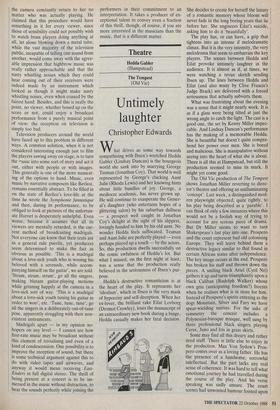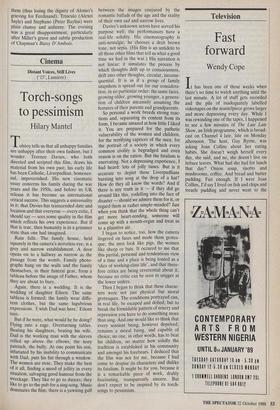Theatre
Hedda Gabler (Hampstead) The Tempest (Old Vic)
Untimely laughter
Christopher Edwards
What drives us some way towards sympathising with Ibsen's wretched Hedda Gabler (Lindsay Duncan) is the bourgeois world she sank into by marrying George Tesman (Jonathan Coy). That world is well represented by George's clucking Aunt Julie (Rhoda Lewis) and her knowing hints about little bundles of joy. George, a mediocre academic, has never grown up. He will continue to exasperate the Gener- al's daughter (who entertains hopes of a glittering salon) by his suburban dullness — a prospect well caught in Jonathan Coy's delight at the sight of his slippers, lovingly handed to him by his old aunt. No wonder Hedda feels suffocated. Tesman and Aunt Julie are perfectly played — even perhaps played up a touch — by the actors. So, this production dwells successfully on the comic awfulness of Hedda's lot. But what I missed, on the first night at least, was a sense that the production really believed in the seriousness of Ibsen's pur- pose.
Hedda's destructive romanticism is at the heart of the play. It represents her `idealism', which in Ibsen is the very mask of hypocrisy and self-deception. When her ex-lover, the brilliant rake Eilat Lovborg (Dermot Crowley), loses the manuscript of an extraordinary new book during a binge, Hedda casually makes her fatal decision. She decides to create for herself the luxury of a romantic memory whose bloom will never fade in the long boring years that lie before her. She engineers Eilat's suicide, asking him to do it 'beautifully'.
The play has, or can have, a grip that tightens into an intense if melodramatic climax. But it is the very intensity, the very melodrama that seem to embarrass the key players. The scenes between Hedda and Eilat provoke untimely laughter in the audience. It is almost as if, at times, we were watching a revue sketch sending Ibsen up. The lines between Hedda and Eilat (and also many by Clive Francis's Judge Brack) are delivered with a forced seriousness that actually subverts them.
What was frustrating about the evening was a sense that it might nearly work. It is as if a glass were being tilted at just the wrong angle to catch the light. The cast is a good one, the set by Kenny Miller impec- cable. And Lindsay Duncan's performance has the making of a memorable Hedda. She is beautiful but doesn't quite compre- hend her power over men. She is bored and malicious. She is manipulative without seeing into the heart of what she is about. There is all this at Hampstead, but still the production seemed to miss its mark. It might yet come good.
The Old Vic production of The Tempest _shows Jonathan Miller reverting to direc- tor's theatre and offering an unilluminating `concept'. Last week, a distinguished mod- ern playwright objected, quite rightly, to his play being described as a 'parable'. I can think of only a few instances where this would not be a foolish way of trying to account for any serious piece of drama. But Dr Miller seems to want to turn Shakespeare's last play into one. Prospero and the court represent bad old colonising Europe. They will leave behind them a destructive legacy similar to that found in certain African states after independence. The key image occurs at the end. Prospero has broken his staff and thrown down the pieces. A smiling black Ariel (Cyril Nri) gathers it up and turns triumphantly upon a black Caliban (Rudolph Walker) whose own grin (anticipating freedom?) freezes when he realises what is in store for him. Instead of Prospero's spirits entering as the dogs Mountain, Silver and Fury we have spear-wielding natives. For the sake of symmetry the conceit includes a Polynesian-baroque masque, well sung by three professional black singers playing Ceres, Juno and Iris in grass skirts.
Some may find all this dreary and rather tired stuff. There is little else to enjoy in the production. Max Von Sydow's Pros- pero comes over as a loving father. He has the presence of a handsome, sorrowful intellectual. But the part lacks any real sense of coherence. It was hard to tell what emotional journey he had travelled during the course of the play. And his verse speaking was sadly unsure. The court scenes had unwonted humour foisted upon
them (thus losing the dignity of Alonso's grieving for Ferdinand). Trinculo (Alexei Sayle) and Stephano (Peter Bayliss) were plain clumsy and unfunny. The evening was a great disappointment, particularly after Miller's grave and subtle production of Chapman's Bussy D'Ambois.



































































 Previous page
Previous page